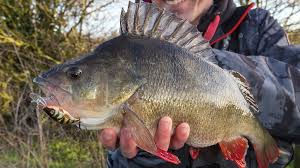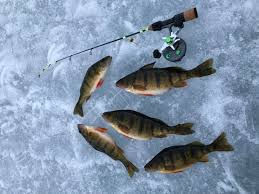The 7 Best Perch-Catching Tips Every Angler Needs To Know
- inthaloop1
- Mar 27, 2023
- 5 min read
Updated: Mar 29, 2023
Angling is a popular pastime the world over, with people of all ages and abilities enjoying the challenge of trying to outwit a fish. Perch are one of the most popular targets for anglers, thanks to their abundance in many waterways and their willingness to take a bait.
While perch can be caught relatively easily, there are a few tips and tricks that can help you to be more successful. In this article, we will share with you the 7 best perch-catching tips every angler needs to know. With these tips, you will be able to improve your chances of success and enjoy even more success when out on the water.

1. Use the Right Bait:
Perch are known for their love of live bait such as worms, grubs, and minnows. Artificial lures can also be effective, but live bait is often the best option.
Perch have a strong sense of smell and are attracted to the scent of live bait. Worms are a popular option as they can be found in most bodies of water and are easy to obtain. Grubs and small minnows can also be effective, especially when fished near the bottom.

Artificial lures that mimic small baitfish or insects can also be successful when targeting perch. Jigs, spinners, and small crankbaits are all popular options. When using artificial lures, it's important to vary the retrieve speed and depth until you find what works best.
Overall, whether you choose live bait or artificial lures, it's important to match the size and color to the natural food sources found in the body of water you are fishing. With a little experimentation and patience, you can have a successful day of perch fishing.
2. Know the Best Time to Fish:
Perch are more active during certain times of the day. Early morning and late afternoon/early evening are typically the best times to fish for perch.
During these times, perch are more likely to be feeding and actively swimming in search of food. They tend to be less active during midday when water temperatures are higher and the sun is stronger. However, this can vary depending on the weather and time of year. In colder months, perch may be more active during midday when the water temperature is warmer.

It's also important to pay attention to the weather conditions and adjust your fishing strategy accordingly. On cloudy and overcast days, perch may be more active throughout the day, while on clear and sunny days, they may be more active during the early morning and late afternoon.
3. Look for Cover:
Perch are often found near underwater cover such as weed beds, fallen branches, and other structures. These areas provide them with hiding places and food sources.
Perch are ambush predators and they use these areas to hide and wait for prey to come close. They feed on smaller fish, insects, and crustaceans that are abundant in these areas.

Weed beds provide perch with cover from predators such as larger fish and birds. Fallen branches and other structures in the water offer perch with shelter and a place to rest. These structures also attract small fish and insects which perch feed on.
During the summer, perch move to deeper water in search of cooler temperatures. They may still be found near underwater cover, such as drop-offs, where they can feed on baitfish.
If you're looking to catch perch, it's important to look for areas with underwater cover. Use bait or lures that mimic the type of prey that perch are feeding on in that area to increase your chances of catching them.
4. Use Light Tackle:
Perch have a small mouth, so you should use light tackle such as a light spinning rod and reel, and a thin line. This will help you to feel when a perch takes the bait.

You can use live bait such as worms or minnows, or artificial lures such as jigs or spinners. When using live bait, make sure to hook the bait through the lips, as this will allow it to move naturally in the water and attract the perch. If using an artificial lure, try to imitate the movements of small fish or insects.
Perch tend to stay near the bottom of the water, so you should use a sinker or weight to keep your bait at the right depth. A bobber can also be used to keep your bait suspended at a certain depth and signal when a fish bites.
When you feel a perch biting, give it a slight tug to set the hook and reel in slowly. Be patient, as perch can be finicky and may take some time to fully take the bait. Once you catch one, there is a good chance there are more in the area, so keep fishing in the same spot.
5. Vary Your Presentation:
Perch can be finicky, so it’s important to vary your presentation to find what works. Try using different baits, varying the retrieve speed, and changing the depth at which you’re fishing.

Additionally, consider using smaller hooks and lighter lines to match the small size of the perch. Keep in mind their natural feeding habits, such as hunting for small crustaceans at the bottom of the lake, and adjust your presentation accordingly. Patience is key when fishing for perch, as it may take some time to find the right technique and location.
6. Pay Attention to the Water Temperature:
Perch are more active in warmer water, so if the water temperature is too cold, it may be more challenging to catch them.

However, there are still ways to increase your chances of catching perch in colder water. Here are a few tips:
a. Find warmer water areas - Look for areas where the sun is shining directly on the water or areas where the water is shallower. These areas tend to heat up faster and attract more fish.
b. Use slow-moving lures - Perch tend to slow down in colder water, so using slower-moving lures like jigs or soft plastics can increase your chances of catching them.
c. Fish during the warmest part of the day - As the day goes on, the sun will heat up the water, making it more comfortable for perch to move around and feed.
d. Use live bait - Perch may be less active in colder water, but they still need to eat. Using live bait like worms or minnows can entice them to bite.
Overall, fishing for perch in colder water requires a bit more patience and preparation, but it is still possible to have a successful trip with the right approach.
7. Practice Patience:
Fishing for perch can require some patience, so don't get discouraged if you don't get a bite right away. Stay focused and keep trying different techniques until you find what works.

Some tips for fishing for perch include using live bait such as worms or small minnows, fishing near weeds or other structures where perch like to hide, and using a light line and small hooks to maximize your chances of catching them. It may also be helpful to use a bobber or other indicator to help you detect when you have a bite. Remember to always follow local fishing regulations and obtain any necessary permits before heading out to fish.

By using these 7 tips, you'll be on your way to catching more perch on your next fishing trip. Remember to always follow local fishing regulations and practice catch and release when possible to protect fish populations for future generations.




Comments